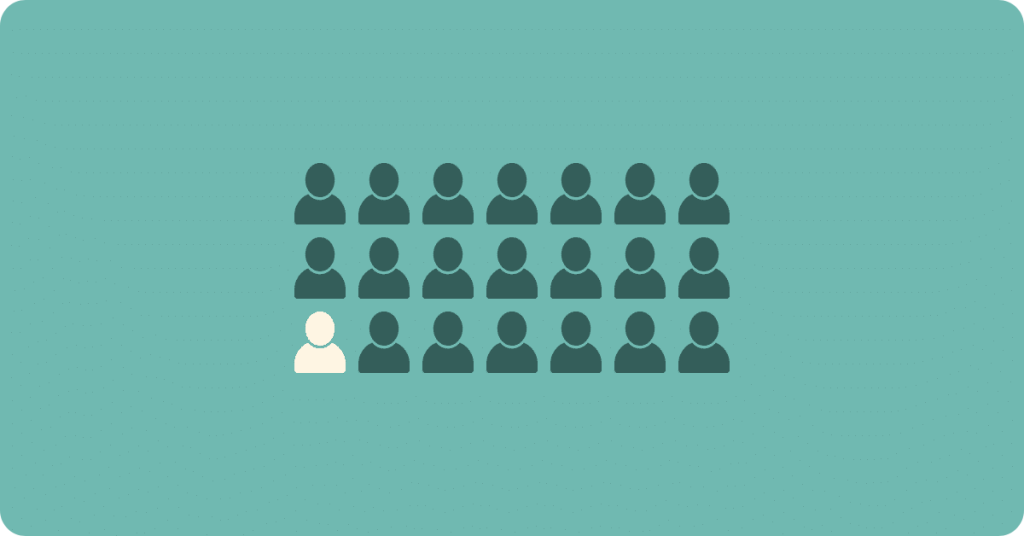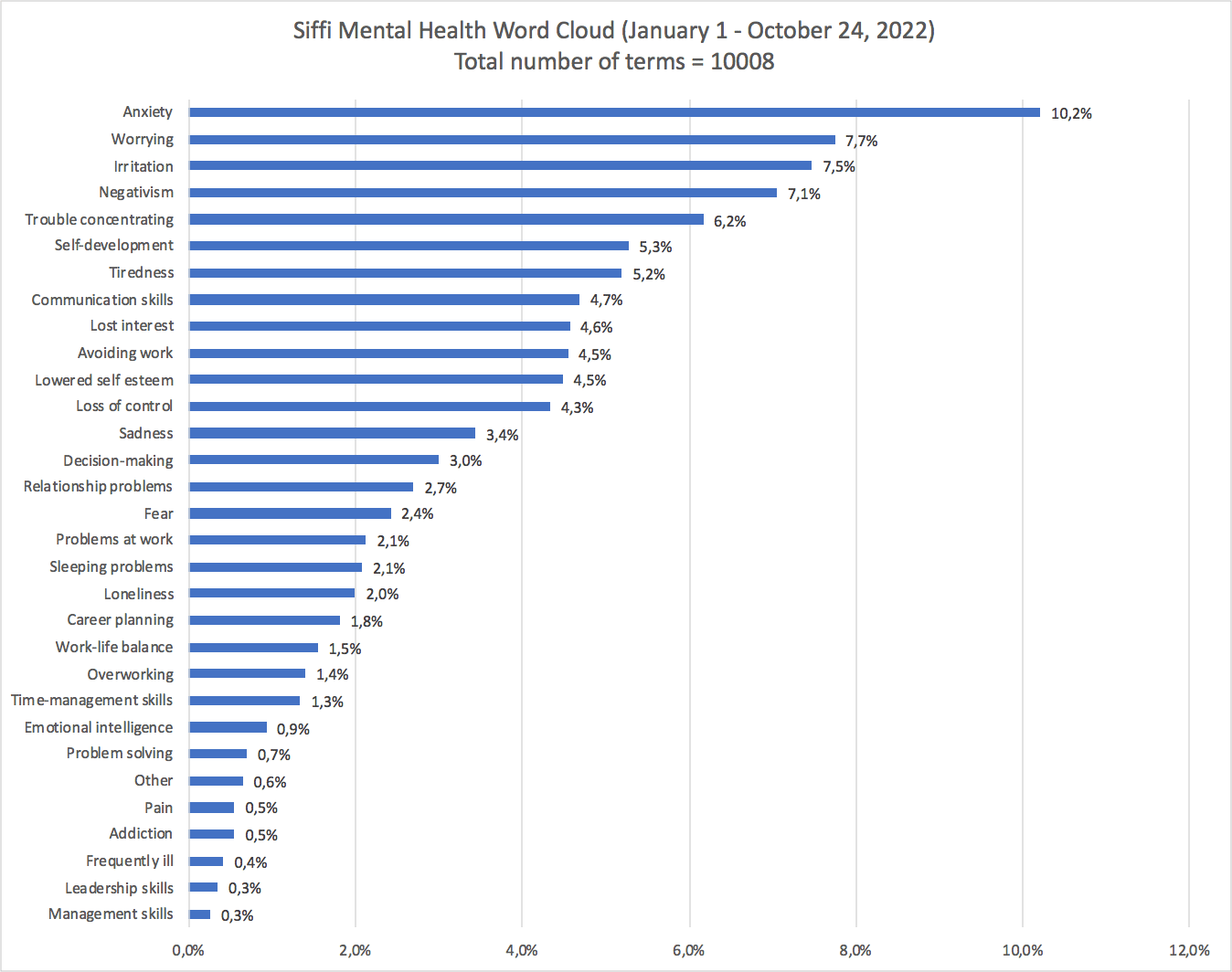What mental health problems troubled employees in 2022?
-
Morgane Oléron

As it is only two months until the end of the year, it is the time when many start to reflect on what has been accomplished until now and what is left for us to complete. At Siffi, we find it interesting to dive into the data of the year ending and understand what have been the main employee mental well-being-related challenges over the past 10 months.
HOW DO WE GATHER THIS DATA
This information is gathered from the Siff platform. We have more than 11,000 employees under our service provision and the abundance of data gives us opportunities to draw some conclusions. All of the data is strictly anonymous. We take the trust that has been given to us seriously.
The 31 keywords in the graph below (see next paragraph) constitute the selection of issues that employees entering our service for the first time can choose from. It is a simple way of entering the chat with our on-demand therapist but it also enables us to narrow down the conversation immediately in the right direction. Any person contacting a healthcare professional selects relevant keywords to indicate the topics they want to discuss. There is no restriction (minimum, maximum, or otherwise) in selecting suitable keywords for a consultation.
For the mental health professional, these keywords indicate if the person contacting them has a specific problem or has a wider range of issues that, when combined, can present a set of symptoms, which in turn can give the cause a deeper concern.
For example, tiredness, loss of interest, and trouble concentrating might indicate stress or mood disorders. Feeling tired and having problems with sleeping can go together, but not necessarily, and it is insightful if a person indicates tiredness without having any trouble sleeping, because that might mean they are experiencing mental exhaustion.
THE TOP ISSUES IN 2022
All emotions and issues, that are mentioned in the table below, are normal in everyday life. They become a problem when they persist for a long time and start to negatively affect our daily routine.
The top four main issues in 2022: anxiety, worrying, irritation, and negativism do not come as a surprise to our psychologists as they are the most common struggles in the workplace nowadays. It is also interesting to note that such patterns seem to mostly appear around the holiday periods: like the summer vacations and Christmas time. That indicates that special attention to well-being and mental health should be given ahead of these times.
Anxiety and worrying (which is the same top 2 as our 2021 data) quite often go hand in hand. For example, you can be in a state of worry without being anxious, but extreme worrying may induce anxiety. You can read more about anxiety in our blog.
Not every case of anxiety has obvious symptoms. Some forms of anxiety mean persistent worry thoughts that come from rational reasons such as money, relationships, and career, or from irrational reasons. Being constantly worried causes sleep disturbance, fatigue, and loss of ability to work. Although scientists have not been able to find the exact cause for this disorder, both heredity and the surrounding environment have their part.
Feeling anxious, worried, or both can with time impact our performance as it can lead to irritation and negativism which are the 2 next most mentioned issues at the office in 2022 for Siffi users.
See below the full list of mental health issues and their weight in 2022 by people who have opted to talk to a mental health professional.

A NOTE ON LONELINESS
Quickly looking back at our 2021 numbers we noticed that the keyword ‘Loneliness’ went back from ranking 12th in 2021 to now ranking 18 in 2022. Something that might be attributed to COVID restrictions being less and less severe and disappearing completely in many countries this year, allowing people to slowly regain the ability to meet, go back to the office, and return to a more active social life.
WHAT TO DO WITH THE DATA?
Anxiety disorders together with depression are the leading mental health issues around the world. WHO has indicated that the global pandemic has increased the prevalence of anxiety and depression by 25% worldwide. Those issues were a huge burden already before, but the pandemic has made it even worse. Even though it seems that COVID-related news and stress have decreased during 2022, we still have to deal with the mental health issues COVID triggered or made worse. Mental health is not always quick to recover and some people are still suffering from Covid-related issues.
Another stressful event that has had a huge impact on people’s mental health during 2022 is the war breaking off in Ukraine. We didn’t have any time to recover from the pandemic before another huge and stressful event happened in the world. All this has decreased people’s sense of safety, they have a lot on their minds and the future seems even more unpredictable than before. Considering all this, it is no wonder that the top issue in 2022 is anxiety.
Those are major anxiety-inducing events over which people have little to no control. But we can’t forget about the little everyday matters that can also play a role when we talk about anxiety or other mental health issues. Despite what’s going on in the world, we are still living our everyday lives, and life will always offer us plenty of challenges to deal with. Sometimes those challenges are too much to cope with and mental health problems can occur. Anxiety disorders are one of the most common ones.
Work is a big part of people’s lives and what is going on in the workplace has an impact on every other area of life, and vice versa, if someone has trouble or issues in their private life, it can have an impact on performance at work. Both cases are possible and common. Also, some forms of anxiety disorders will impact people everywhere they go and it’s quite difficult to pinpoint where the issue originated from. Mental health problems usually don’t have only one specific reason and they also vary in severity. For the employer, it is always a good idea to offer mental health support to the employees. In today’s world with such unstable times, it can be much more difficult to cope with everyday issues and even little things can seem like something difficult and unsolvable. Sometimes we get stuck in our negative thinking patterns and different cognitive biases can happen. It can be very difficult to start seeing solutions on our own. In such cases having the possibility to get professional help can have a huge impact on people’s lives and also on their performance at work.
The most important thing as an employer is to show your employees that you are acknowledging this feedback and acting on them. It’s important to create a supportive mental health culture that includes many dimensions. It is often where Siffi can help with its experience and broader expertise in this very topic.
Siffi is one easy tool that can be brought into the workplace to address many of these symptoms.
In addition, many simple things can be implemented or improved in the day-to-day of the team or company. Workshops training retreats and coaching are also available.
In 2022, in its World Mental Health Report: Transforming Mental Health for All, WHO mentioned the need for transformative action on mental health in the workplace. By sharing these data and constantly improving our tools and services, Siffi is proudly taking part in this change.
Related:
MENTAL HEALTH TRENDS TO FOLLOW IN 2025
About the author

Morgane Oléron
Mental wellbeing content writer at Siffi
Morgane crafts compassionate, engaging content that makes mental health conversations more human and accessible. At Siffi, she combines storytelling with strategy to foster a culture of care and connection in the workplace.
Recent posts
-
Another negative headline: how news affects our mental health28 Apr 2025
-
The power of employee resource groups in promoting mental well-being14 Apr 2025
-
From stress to success: Mindfulness techniques for tech Employees07 Apr 2025
-
Millenials vs Gen Z: Are workplace tensions inevitable?24 Mar 2025
-
What is success, really?17 Mar 2025